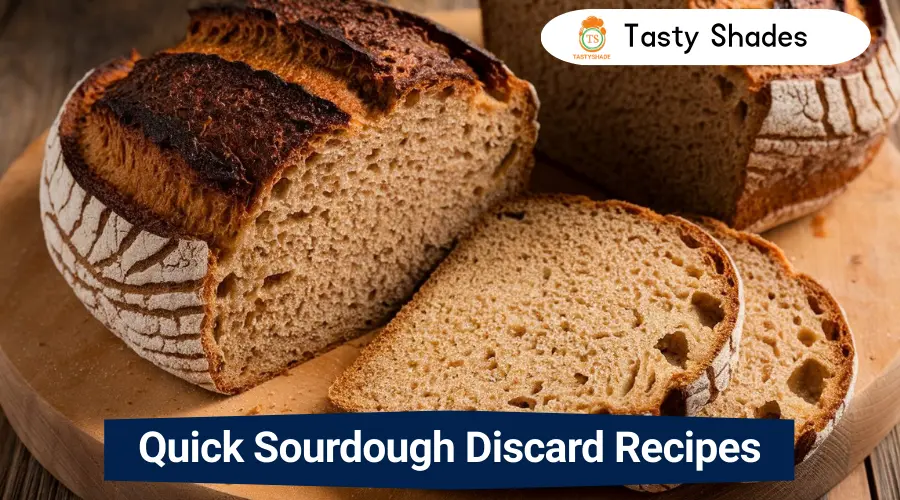Sourdough discard, a byproduct of your sourdough starter, is a goodie to use and one that will elevate your baking game. Here you are at the best best recipe blog to know amazing information regarding these effective recipies. Sourdough discard quick recipes, and certainly, other sourdough discard recipes, are great for using up this surplus, but common mistakes can derail the end result. Next, I’ll take a look at some of the pitfalls and how to avoid them.

Not Encountering The Discard’s Acidity in Quick Sourdough Discard Recipes
Underestimating the acidity of the discard is one of the most common mistakes you’ll make with quick sourdough discard recipes and . Often, this results in a bland and flat final product. For better flavor and texture, you need to check the balance of the acidity of discard with the other ingredients, namely baking soda or buttermilk. The acid is neutralized by these ingredients, causing a more flavorful bake that’s also more airy.
Incorrect Discard Proportion in Quick Sourdough Discard Recipes
The second common mistake is throwing sourdough discard into something in the wrong proportion. Too much discard can make a dense, sour loaf; too little doesn’t add enough flavor. The ratio for each recipe is different, and the desired outcome is different. Finding the perfect balance depends on experimentation.
Not Preheating the Oven Before Making Quick Sourdough Discard Recipes
Even for quick sourdough discard recipes, you should preheat your oven. When you preheat your oven, you’re creating the same baking environment. This way, the heat is evenly distributed so that your loaf can be baked well. Not doing this step can yield an unevenly baked item, a soggy bottom and a dense crumb.

Making Quick Sourdough Discard Recipes With Less Time for Setting the Materials
Quick sourdough discard recipes and the quick pickle recipe are supposed to be fast, but your dough still needs time to develop, so don’t skip doing that. It provides the gluten with some time to rest, so it’ll be easier to work with. Flavors develop a little, and you get a more flavorful loaf. If you hurry into this, you could end up with a tough or chewy loaf.
Ignoring Temperature and Humidity Considerations for Making Sourdough Discard
Sourdough fermentation is dependent upon temperature and humidity. Fermentation should take place at ideal temperatures of about 70-80°F (21-27°C). Fermentation can be slowed down by high humidity but sped up too much by low humidity. Fermentation needs to be watched carefully so that these factors stay optimal. If ignored, these considerations can result in inconsistent results, including underproofed, overproofed, and more.
Lack of Quality Materials for Quick Sourdough Discard Recipes
You get what you put in. If you have low-quality flour or stale discard, you may end up with an equally dense and flavorless loaf. The best results are always obtained by using high-quality, freshly milled flour forquick sourdough discard and quick daniel fast recipes . Also, make sure your discard is alive and fresh. With poor fermentation (and a disappointing loaf!), a loaf can be affected by old or inactive discard.
Improper Baking Time and Temperature
Sourdough baking time and temperature are as important as getting it right. Over or under-cooking the loaf is also a result of baking the loaf for too short or too long. As a result, oven temperature will also either increase or decrease the loaf texture and taste. Cooking time and temperature are always followed by the appropriate recipe directions.
Improper or Lack of Thorough Mixing of Substances in Sourdough Discard Recipes
Without thorough mixing, the dough will have no gluten, which will give it structure and elasticity. If the ingredients are not mixed properly, all the gluten will not develop correctly, and the loaf will not be of proper quality. Mix the ingredients with a dough scraper or your hands until well combined. This, however, is not without downsides — overmixing is also not something you should do.
Trying to Make Quick Sourdough Discard Recipes on the First Attempt
I designed this quick, easy sourdough discard recipe as beginner-friendly, but keep in mind that baking is not easy, and it does take time and practice. It can be hard to try to master these recipes on your first attempt. You begin by making simpler recipes and get more complex as you can.
Using Old or Moldy Discard for Baking Sourdough
Don’t use the old or moldy discard — Mold can produce poisonous toxins that may make you sick. Discard any discarded items that show any mold signs. A good bake needs fresh, active discard. If your discard is old or inactive, you can refresh it by feeding it flour and water.
Conclusion
You avoid these common sourdough baking mistakes that will get you to skill up and start consistently creating delicious loaves of bread! But remember, patience and practice pay off. Over time and with work practice, you will get good at sourdough baking. For more and extra information you may visit: pantry mama and farm house on boone.
FAQs
Why are quick and easy sourdough discard recipes important?
Sourdough discard quick recipes can be delicious, quick and easy. It’s a great way to use up excess sourdough starter because you can turn it into delicious treats.
What is the best practice for discarding sourdough to make pancakes?
Sour a little bit of your sourdough, discard it and, mix it into your pancake batter for tanginess and chew a little bit. To achieve your desired consistency, adjust the batter’s hydration.
What is the best way to discard sourdough to make waffles?
Sourdough discard in your waffle batter will add a great flavor and the crispy waffle outside with the tender inside. It will also add to a longer, fresher life.
What sourdough discard muffin recipes are in demand in the USA?
In the United States, Sourdough blueberry muffins, sourdough chocolate chip muffins and sourdough cornbread muffins are popular.
Is there a simple way to discard sourdough to make pizza dough?
You can definitely use sourdough discard in your pizza dough recipe. Sourdough will add something to flavor and tighten the structural self of the dough.
Can I use sourdough discard to make bagels?
Absolutely! Bagels have taken their fair amount of sourdough discard. It can also make the dough chewier, and the dough rises more.
Can sourdough discard be stored at home for later use?
Sourdough discard can be stored in the refrigerator for several days and in the freezer for much longer. To prevent waste, portion it when freezing and put it in small containers.
What are some gluten-free sourdough discard recipes?
Gluten-free sourdough flour alternatives such as almond flour or coconut flour can be tried on the gluten-free side; traditional sourdough relies on gluten for structure.
How do you freeze sourdough and discard it in the best way?
So I portion sourdough and discard it into airtight containers, leaving a bit of space for expansion to occur. Put them in the freezer lab, el the containers, and date them.
Are there some healthy sourdough discard recipes?
Sourdough discard can be used to make recipes that are both healthy and nutritious. Other ideas for using sourdough discard: Make whole grain sourdough, discard pancakes, or sourdough crackers with seeds and herbs.
Can I use sourdough discard to make bread?
Absolutely! If you have sourdough, discard it; making delicious bread is really easy. Adding them can help add some flavor and texture, as well as numbers on the nutritionals for your loaves!
What are sourdough discard crackers?
Crispy, tasty sourdough discard crackers. Mixing spices, herbs, or cheese helps.
What sweet sourdough discard recipes are liked in the United States?
Sweet treats in the United States include sourdough, which is discarded muffins, scones, and cookies. It has a tangy flavor and is uniquely textured.
How do you use sourdough discard to use cookies?
Sourdough discard is also great for adding flavor and improving texture to cookie dough. The sourdough flattest out the cookies so they don’t spread as much and stay chewy.
What is a sourdough starter?
A sourdough starter is a dough of flour and water that has been fermented by wild yeast and bacteria. Used to leaven dough, it’s the foundation for sourdough baking.
